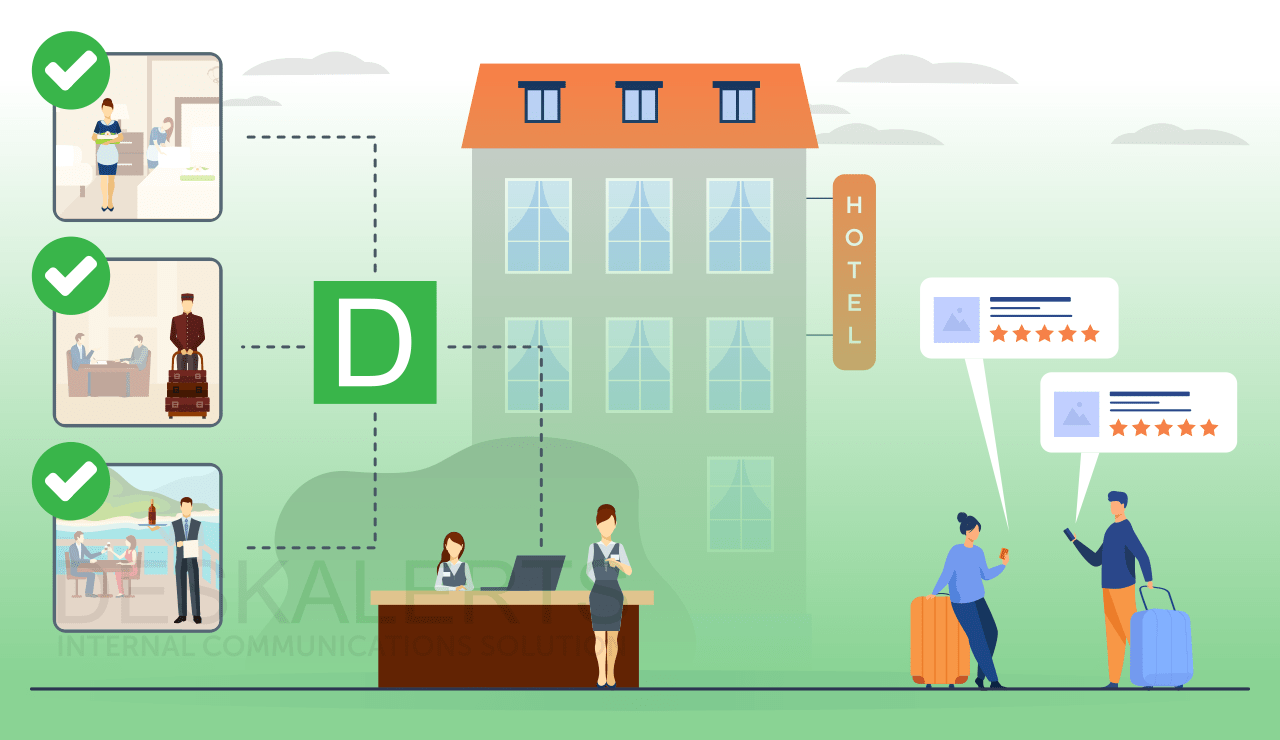
Table of contents
Why Employee Communications in Hotels is Crucial?
Challenges in Establishing Ideal Guest Communication
Strategies to Boost Guest Communication in Hotels
10 Recommendations to Improve Communication in Your Hotel
Why You Need DeskAlerts for Hospitality Communications
Why Employee Communications in Hotels is Crucial?
In the dynamic realm of hospitality, where guest satisfaction reigns supreme, the importance of efficient employee hotel communications cannot be overstated. Before delving into the specifics, it's crucial to grasp the fundamental reasons why employee communications play a pivotal role in the seamless functioning of hotels. Explore the critical nature of employee communications, illuminating how it serves as the linchpin for successful operations, teamwork, and, ultimately, guest experiences. By nurturing clear and effective communication channels among hotel staff, establishments can ensure a harmonious work environment, leading to heightened guest satisfaction and loyalty. Discover the indispensable role of employee hospitality communications in weaving the intricate tapestry of the hospitality industry.
Challenges in Establishing Ideal Guest Communication
In the pursuit of delivering exceptional guest experiences, the hospitality industry encounters various challenges in establishing ideal communication with guests. Before delving into these challenges, it's crucial to recognize the intricate nature of guest communication in hotels. Understand the common hurdles faced by establishments when striving for ideal guest communication, shedding light on the complexities involved in meeting diverse guest expectations. By acknowledging these challenges, hotels can proactively address them, creating strategies that enhance guest satisfaction and contribute to the overall success of the establishment. Delve into the intricacies of guest communication in the ever-evolving landscape of the hospitality industry.
Strategies to Boost Guest Communication in Hotels
In the competitive hospitality industry, enhancing guest communication is crucial for delivering exceptional experiences. Prioritizing effective communication with guests is fundamental to ensuring positive perceptions and overall satisfaction. This involves implementing strategic approaches that foster meaningful connections, allow anticipation of guest needs, and create an environment conducive to guest loyalty. Explore a range of strategies designed to elevate guest communication and enhance the overall guest experience within hotels.
Here are some strategies to boost guest communication in hotels:
Embrace modern communication tools such as mobile apps, chatbots, and messaging platforms to facilitate quick and convenient interactions with guests.
- Personalized Communication
Tailor communication based on guest preferences and past interactions to create a more personalized and memorable experience.
Anticipate guest needs and reach out proactively with relevant information, offers, or assistance, enhancing their overall stay.
- Clear Information Channels
Ensure that information about services, amenities, and local attractions is readily available through clear communication channels, including signage, brochures, and digital platforms.
Implement easy-to-use feedback systems to encourage guests to share their thoughts and suggestions, demonstrating a commitment to continuous improvement.
Provide staff with communication training to ensure they can effectively convey information, address queries, and handle guest interactions professionally.
Cater to diverse guests by offering communication in multiple languages, both in written materials and through staff members proficient in various languages.
Keep guests informed about any changes, events, or promotions in real-time, creating a sense of transparency and involvement.
Actively engage with guests on social media platforms, responding promptly to inquiries, sharing relevant content, and leveraging these channels for communication.
Strengthen relationships by following up with guests after their stay, expressing gratitude, and seeking feedback for future improvements.
By incorporating these strategies, hotels can enhance guest communication, create positive experiences, and build lasting relationships with their clientele.
10 Recommendations to Improve Communication in Your Hotel
Effective communication is the heartbeat of a well-functioning hotel, influencing both internal operations and guest satisfaction. Explore these ten recommendations designed to elevate communication standards within your hotel:
- Establish Clear Communication Channels
Ensure that communication channels within the hotel are clearly defined, creating a seamless flow of information between departments and staff members.
- Implement Regular Training Programs
Conduct regular training programs focused on communication skills for hotel staff, emphasizing the nuances of effective guest interactions and teamwork.
- Utilize Technology for Internal Communication
Leverage technology platforms and tools to streamline internal communication processes, ensuring that important updates and information reach all staff promptly.
Foster a culture of open communication, encouraging staff members to share ideas, concerns, and feedback, creating a collaborative and supportive work environment.
- Implement Guest Feedback Systems
Establish systems to collect and analyze guest feedback, allowing the hotel to identify areas for improvement and enhance overall guest satisfaction.
- Provide Multilingual Support
In diverse hospitality settings, offer multilingual support to cater to the needs of a global clientele, ensuring effective communication with guests from various backgrounds.
- Create Standard Operating Procedures (SOPs)
Develop clear and concise SOPs for communication protocols, ensuring that all staff members are aligned with standardized procedures for efficient operations.
- Facilitate Team Building Activities
Organize team-building activities to strengthen interpersonal relationships among staff members, fostering a sense of unity and cooperation.
- Utilize Visual Communication Aids
Implement visual aids such as signage and infographics to convey information effectively, particularly in areas where language barriers may exist.
- Establish a Communication Feedback Loop
Create a feedback loop where staff members can provide input on communication processes, allowing for continuous improvement and adaptation to evolving needs.
By incorporating these recommendations, hotels can create a communication environment that enhances both internal operations and guest experiences, contributing to overall success in the competitive hospitality industry.
Why You Need DeskAlerts for Hospitality Communications
In the realm of hospitality, effective communication is paramount for ensuring seamless operations and delivering exceptional guest experiences. DeskAlerts emerges as a valuable solution tailored to meet the unique communication needs of the hospitality industry. This robust platform offers a centralized and efficient means of disseminating important information, updates, and announcements to staff members across various departments. With DeskAlerts, hotels can streamline internal hospitality communication, promptly address guest needs, and enhance overall service quality. The platform's versatility, ease of use, and real-time capabilities make it an indispensable tool for hospitality establishments seeking to elevate their communication strategies and provide unparalleled guest satisfaction. Discover the myriad benefits of DeskAlerts for optimizing hotel communications and fostering a more connected and efficient operational environment.
***
FAQ
What Are 10 Ways to Improve Communication?
Improving communication in the hospitality industry is crucial for delivering exceptional guest experiences and ensuring seamless operations. Here are ten effective ways to enhance communication:
Leverage Technology:
Embrace modern communication tools such as mobile apps, chatbots, and digital signage for quicker and more efficient information dissemination.
Personalize Communication:
Tailor communication based on guest preferences to create a more memorable and individualized experience.
Proactive Engagement:
Anticipate guest needs and reach out proactively with relevant information or offers before they are requested.
Staff Training:
Provide comprehensive training to staff to ensure effective communication with guests, addressing queries and interactions professionally.
Multilingual Support:
Offer communication in multiple languages to cater to a diverse clientele, ensuring effective interactions for guests who speak different languages.
Social Media Engagement:
Actively engage with guests on social media platforms, responding promptly to inquiries, and using these channels for communication.
Real-Time Updates:
Keep guests informed about changes, events, or promotions in real-time, creating a sense of transparency and involvement.
Clear Information Channels:
Ensure that information about services, amenities, and local attractions is readily available through clear communication channels.
Feedback Mechanisms:
Implement easy-to-use feedback systems to encourage guests to share their thoughts and suggestions, demonstrating a commitment to continuous improvement.
Post-Stay Follow-up:
Strengthen relationships by following up with guests after their stay, expressing gratitude, and seeking feedback for future improvements.
By incorporating these strategies, hospitality establishments can significantly improve communication, leading to enhanced guest satisfaction and overall operational efficiency.
What Is Communication Skills in Hospitality?
Communication skills in hospitality refer to the ability to convey information effectively, both verbally and non-verbally, in the context of the hospitality industry. These skills are crucial for creating positive guest experiences, fostering a collaborative work environment, and ensuring seamless operations within hotels and related establishments.
Verbal Communication:
The capacity to articulate information clearly and concisely is essential for interactions with guests, colleagues, and other stakeholders.
Active Listening:
Understanding guest needs and team member concerns requires active listening, a skill that enables effective comprehension and response.
Non-Verbal Communication:
Non-verbal cues such as body language, facial expressions, and gestures play a significant role in conveying messages and creating a welcoming atmosphere.
Multilingual Proficiency:
In a diverse industry, being proficient in multiple languages enhances the ability to communicate with guests from various cultural backgrounds.
Customer Service Communication:
Engaging with guests in a courteous and helpful manner, addressing inquiries, and resolving issues contribute to superior customer service.
Team Collaboration:
Communicating effectively within the team ensures smooth operations, allowing staff to work cohesively to meet guest expectations.
Problem-Solving Communication:
The ability to communicate solutions to challenges promptly and effectively is vital for maintaining guest satisfaction and resolving issues.
Crisis Communication:
During unforeseen events, being able to communicate clearly and reassure guests and staff contributes to effective crisis management.
Technology Integration:
Utilizing communication technologies such as digital platforms and messaging tools enhances efficiency and responsiveness in the hospitality setting.
Adaptability:
The hospitality industry often involves dynamic situations, and effective communication skills include the ability to adapt to changing circumstances and diverse guest needs.
What Is Effective Communication in the Hospitality Industry?
Effective communication in the hospitality industry refers to the skillful exchange of information, ideas, and messages within hotels and related establishments. It involves clear and concise articulation of information, prioritizing guest needs, and fostering positive interactions among staff members. This communication extends beyond verbal exchanges to include written and non-verbal forms, creating a cohesive and seamless operational environment. Effective communication in hospitality is adaptive, timely, and integrates technology to enhance guest experiences, resolve conflicts, and ensure efficient interdepartmental collaboration. It plays a pivotal role in crisis management, customer service excellence, and continuous improvement through feedback mechanisms. Overall, it is a dynamic and essential aspect of creating a positive and memorable guest experience within the ever-evolving hospitality landscape.
What Is Good Communication in the Hospitality Industry?
Good communication in the hospitality industry embodies a collaborative and customer-centric approach to exchanging information. It goes beyond conveying messages clearly; it involves actively listening to guests and colleagues, understanding their needs, and responding with empathy. Good communication fosters a positive and inclusive atmosphere, facilitating teamwork among staff members and ensuring a seamless guest experience. It involves adapting communication styles to different situations, being attentive to non-verbal cues, and integrating technology for efficient information sharing. Ultimately, good communication in hospitality is the foundation for creating memorable guest interactions, resolving issues effectively, and maintaining a harmonious operational environment.
 Caroline Duncan
Caroline Duncan







